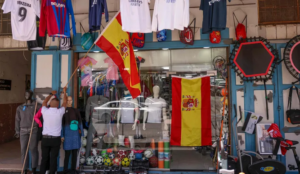Palestinians react with joy – and some cynicism – to state recognition by Spain, Ireland and Norway

A sports supply shop displaying flags of Spain in its window in the West Bank city of Hebron on 21 May 2024
Nagham Zbeedat writes in Haaretz on 23 May 2024:
As Israel condemned Wednesday’s joint declaration by Norway, Ireland and Spain that they would each formally recognize a Palestinian state, the announcement sparked jubilation among many Palestinians.
The Palestinian Authority welcomed Norwegian Prime Minister Jonas Gahr Støre’s announcement, when he noted that “there cannot be peace in the Middle East if there is no recognition.”
In an official statement, the Palestinian presidency said: “We highly value Norway’s decision as it upholds the right of the Palestinian people to self-determination and supports the two-state solution. “Norway has consistently supported Palestinian rights in international forums,” it continued. “This decision aligns with international law principles recognizing the right of peoples to free themselves from colonialism and oppression.”
Hussein Al-Sheikh, secretary of the PLO executive committee, also expressed gratitude for the move. “Thank you to the countries recognizing the State of Palestine. This is the path to regional stability, security and peace.”
Hamas also welcomed the recognition, calling it “an important step on the road to base the right of the Palestinian people over its land, including the establishment of an independent Palestinian state with Jerusalem as its capital.”
Palestinian politician and former PA Education Minister Hanan Ashrawi welcomed the news on her X account. “With a great deal of love & appreciation, we thank Norway, Ireland, & Spain for their recognition of the state of Palestine as a genuine commitment to justice & equality. With such states, freedom & peace are attainable goals as hope is renewed.”
Osama Othman, a Palestinian columnist at the London-based Al-Araby Al-Jadeed newspaper, tweeted that despite the good news, the recognition only covered 20 percent of Palestine, noting that the other 80 percent remained Israeli according to the Oslo Accords. He said that despite that, Israel was still angry. As long as Israel and Netanyahu stayed like that, he said, the solution remained the same: that Palestine is not restricted by any Oslo Accords limits.
The Tahawoulat Center, an Arab organization focusing on geopolitics, said the move marked a major shift from the previous diplomatic approach and was an expression of complete distrust in Israel with regard to the Palestinians. It added that the move signaled the end of leniency toward Israel at the expense of Palestinian rights, and that Israel’s legitimacy was in serious decline.
The center also said the U.S. approach had become disconnected from reality and an obstacle to justice. It added that Israel was facing increasing delegitimization, with this week’s recognition achieving more for the Palestinian cause than decades of negotiations.

Spanish Prime Minister Pedro Sanchez is applauded by members of the government after announcing that Spain will recognize Palestine as a state on May 28, in Madrid on 22 May 2024
Amid the joy among Palestinians who saw the news as a historic milestone, Ali Chreif a writer, researcher and activist on social media, asked: “Ireland recognized the State of Palestine today and Norway will follow on May 27. But the question remains: Which State of Palestine are they recognizing? What are its boundaries? Is it the unelected state of [Palestinian President] Mahmoud Abbas, imposed by America? These suspicious recognitions seem intended to deceive their people, cover up the enemy’s crimes in Gaza and complete the deal of the century,” referring to former U.S. President Donald Trump’s MidEast Peace Plan from 2020.
Like Chreif, Maysara, a young Palestinian activist from Gaza, wasn’t as overjoyed as others. He tweeted that the recognition of a Palestinian state could have been achieved a long time ago if the two rival Palestinian factions, Hamas and Fatah, had cooperated. “Ironically, after 30 years of Israel’s procrastination in implementing the Oslo Accords and thwarting the two-state solution, Oslo recognized a Palestinian state unilaterally. Spain and Ireland followed suit, and while changing the name from ‘Palestinian Authority’ to ‘Palestinian State’ may not change much immediately, it remains a brave and encouraging step. The more countries that recognize Palestine, the greater the possibility of boycotts and sanctions on settlements, preventing weapon exports, and more.
“This recognition is a result of the sacrifices of our people, especially in Gaza, and the Israeli crimes of genocide, not solely the war efforts or [Mahmoud Abbas’] diplomacy,” Maysara added. “If Hamas’ armed resistance and Fatah’s diplomatic efforts had been integrated, such recognition might have come much sooner.”
The three European countries’ recognition of a Palestinian state has sparked a very specific debate online: who deserves most credit for the achievement?
Some attributed it to Saudi Arabia and Crown Prince Mohammed bin Salman allegedly pressuring countries to recognize a Palestinian state. Others said it was the people of Gaza who have endured over 200 days of death and loss, while some credited Hamas’ October 7 attack on southern Israel.
Ahmed, a Palestinian from Gaza, offered a satirical view: “I bear witness to the Saudi demonstrations, led by bin Salman himself in Madrid and Catalonia, urging the Spanish government to recognize Palestine. Saudi Celtic [soccer] fans also showed solidarity in Irish stadiums, while Saudis in Ireland held demonstrations in Dublin, highlighting their past persecution by Britain and Gaza’s current plight. Additionally, Saudis in Brussels staged weekly protests demanding Belgian recognition of Palestine.”
He then questioned the Saudis’ “expired show-off attempts,” and asked why, if they have such international power, they don’t demand that “the Zionist entity leave Palestine.”
This article is reproduced in its entirety
